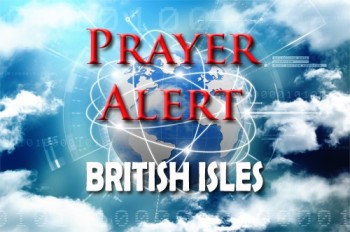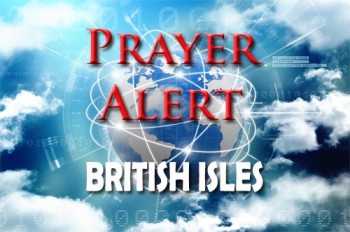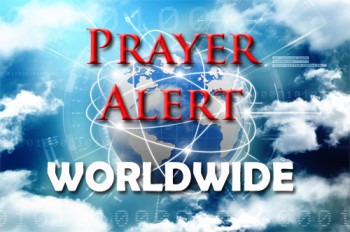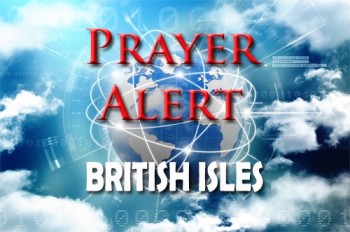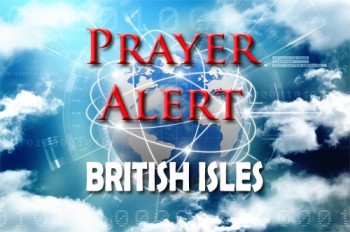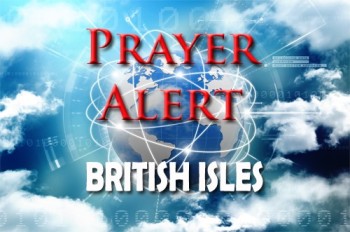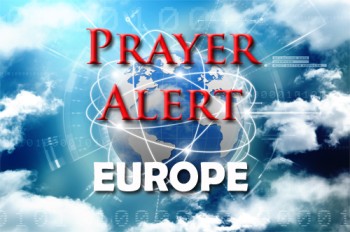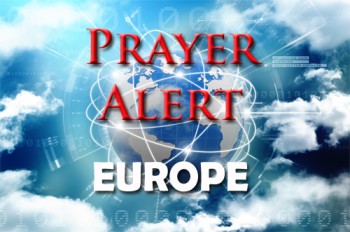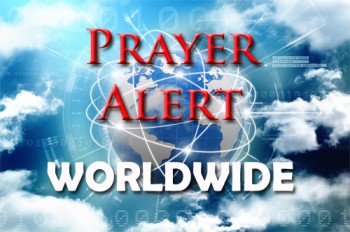
David Fletcher
David Fletcher is Prayer Alert’s Editor.
He is part of a voluntary team who research, proof-read and publish Prayer Alert each week.
If you would like to make a donation towards our running costs, please click here.
In a notorious African prison, 166 death-row inmates existed in a state of despair; but a team of missionaries and medical professionals were undeterred, ready to offer both healthcare and the gospel. Believing in the transformative power of faith, they planned to preach and provide individual counselling during medical checks. They were driven by a conviction that even these forsaken souls deserved to hear the message of hope. As the Gospel was shared, hardened faces softened with tears, signalling an emotional and spiritual awakening among the inmates. This moment marked a shift from hopelessness to a glimmer of hope and understanding. The medical consultations became opportunities for inmates to personally embrace faith, with many choosing to commit to a new spiritual path. The next day, the prison warden observed a profound change. Inmates were deeply engaged in reading the Bible and discussing its teachings, transforming the prison's atmosphere to one of joy and community.
Diane Abbott, an independent MP and former Labour member, has accused both the Conservative and Labour parties of 'shocking' racism in the recent Tory donor controversy. The row centres on businessman Frank Hester's alleged racist and sexist comments about Abbott, for which he has since apologised but insisted he's not racist or sexist. Hester donated £10 million to the Conservatives, which has sparked debate over whether the party should return the funds. Abbott criticised the Conservatives for their long-standing role in perpetuating racism, including personal attacks against her. She also expressed disappointment with the Labour party's response, which initially focused on the financial aspect rather than the racism and sexism involved. The scandal has led to widespread criticism, with political figures across the spectrum, including business secretary Kemi Badenoch and former chancellor Kwasi Kwarteng, condemning Hester's remarks. Rishi Sunak, under increasing pressure, said that Hester's apology should be accepted. Internally, his party faces disagreements over handling the donation, with the Scottish Conservatives calling for a review.
Justin Welby and Stephen Cottrell have expressed concerns over Michael Gove's plans to redefine extremism, warning that the redefinition could mistakenly target innocent individuals, exacerbating division and infringing on freedoms of speech and worship. Welby said that extremism is a shifting problem across all faiths, posing significant dangers, including the rise of antisemitism and Islamophobia. He stressed the importance of involving diverse groups in defining extremism, cautioning against a government-only approach. The current definition of extremism includes opposition to fundamental British values like democracy and mutual respect for different faiths. The archbishops are concerned that Gove's forthcoming redefinition may disproportionately affect Muslim communities, increasing hate and abuse. They urged broader consultation and offered the CofE's assistance in facilitating community discussions. In response, the Government reiterated plans to appoint an independent adviser on anti-Muslim hatred.
NHS England has announced that children will no longer be prescribed puberty blockers at gender identity clinics, except as part of clinical research trials. This significant policy shift follows an independent review and a dramatic increase in referrals to the Gender Identity Development Service (GIDS) - from under 250 to over 5,000 in a decade. Puberty blockers, used to pause physical puberty changes, have been at the centre of debate due to concerns about consent and long-term effects. The trust which runs GIDS will close at the end of March, replaced by two new services at Great Ormond Street and Alder Hey hospitals. These will offer a more holistic approach to care, including experts in neurodiversity, paediatrics, and mental health. Currently, fewer than 100 children are on puberty blockers and will continue their treatment. This decision has been described as a 'landmark' by health minister Maria Caulfield, who has emphasised child safety and evidence-based care. See also
In a distressing incident involving a firm of funeral directors in Hull, East Yorkshire, a widow was shocked to discover that her husband’s ashes, which had been made into jewellery, might not be his. After investigating, the police have removed the bodies of 35 individuals and suspected human ashes. The woman, who lost her husband eight months ago, is now faced with the harrowing task of identifying his body. This development is part of a broader police inquiry, which has led to the arrest and subsequent bail of two individuals. Many families have raised concerns about receiving incorrect ashes following funerals. A friend of another affected family from Beverley described how women in the family had turned ashes into crystal jewellery, only to learn the deceased had been in a freezer all this time, raising questions about which ashes had been used. The police have received over 1,000 calls from the public and are conducting formal identification procedures for the recovered bodies and ashes.
The Government is considering a proposal to offer up to £3,000 to failed asylum-seekers to relocate voluntarily to Rwanda. This plan, aimed at reducing the backlog of asylum applications, is separate from the controversial 'Rwanda bill,' which seeks to deport most asylum-seekers to Rwanda. The new scheme builds on existing policies offering financial assistance for voluntary returns to home countries. In the past year, 19,000 people have voluntarily left the UK under such schemes. The new proposal allows recipients of the financial package to live in Rwanda, a country the Government deems safe despite concerns about political oppression. Under this plan rejected asylum-seekers who currently cannot work legally in the UK would be allowed to work in Rwanda and receive five years of additional support. The government’s Rwanda bill has already been ruled unlawful by the Supreme Court for violating human rights laws. Rishi Sunak is now pushing legislation to designate Rwanda as a safe country for asylum-seekers, hoping to circumvent legal opposition.
Giant redwoods, the world's largest trees, are thriving in the UK, surpassing their native numbers in California. Introduced by the Victorians as a symbol of botanical prestige, there are an estimated 500,000 giant redwoods in the UK, compared to California's 80,000. While not yet reaching the heights of their American counterparts - the tallest in the UK measures 54.87m compared to California's 90m - they have the potential to grow taller over time, as they can live for over 2,000 years. When researchers conducted a study on these trees, using laser scanning to measure their growth, they found they were growing at a similar rate to those in Sierra Nevada and adapting well to the UK climate. While the giant redwoods face climate change threats in California, they may find a more hospitable environment in the UK. However, despite their success, they are not likely to dominate native forests, as they require specific conditions for reproduction.
On 12 and 13 March, Ukraine conducted heavy drone attacks on several Russian oil refineries, seriously damaging one and causing a fire at another, in one of the most serious attacks against Russia's energy sector in recent months. Oil prices rose 2% partly due to concerns about supply disruption following the attacks which Vladimir Putin said were an attempt to disrupt his country's presidential election this week. Russia and Ukraine have both used drones to strike critical infrastructure and military targets, with Kyiv stepping up attacks on Russian refineries and energy facilities in recent months. Ukraine's SBU security service claimed responsibility for the strikes, stating that they aim to weaken Russia's economic strength. The attacks targeted key sources of Russia's income, potentially reducing gasoline and diesel output. Ukrainian forces also targeted a Russian airbase and military airfield. The escalation underscores the intense conflict between the two nations and the potential economic impact of attacks on Russia's energy infrastructure.
Lithuania has blamed Moscow for a brutal hammer attack on Leonid Volkov, a close aide to the late Russian opposition leader, Alexei Navalny, outside his home in Vilnius. Volkov sustained injuries, including a broken arm, in the assault. The Lithuanian president has condemned the attack as a planned provocation, challenging Vladimir Putin's regime. Lithuanian authorities are intensively investigating the incident, attributing it to Moscow's efforts to influence the upcoming presidential election. Volkov has vowed to continue the opposition's struggle against Putin despite the attack. This assault marks the latest in a series of threats and violence against Navalny's allies living abroad, following his recent death in custody. His widow, Yulia Navalnaya, has urged the West not to recognise Russia's upcoming presidential election results, denouncing Putin as a usurper and murderer.
A ship carrying humanitarian aid to Gaza has left Cyprus, marking the first maritime shipment of aid to the war-torn region. It aims to deliver 200 tons of food aid, equivalent to around 500,000 meals, directly to Gaza. The initiative comes amidst growing concerns over famine and malnutrition in the enclave, exacerbated by Israel's restrictions on aid distribution. However, concerns persist regarding the effectiveness of maritime and air-dropped aid compared to traditional deliveries by truck. The ongoing efforts are critical as Gaza faces acute shortages of essential supplies, with rising numbers of children dying from malnutrition and dehydration. Israel has been accused by humanitarian officials of arbitrary and contradictory criteria regarding access. In another development, the US senate majority leader has called for Benjamin Netanyahu to step down: see


